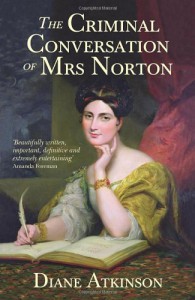33
Followers
37
Following
Jera's Jamboree
I’m an avid reader, loving nothing more than expanding my microcosmic world. I enjoy escaping into all sorts of worlds through reading and also love to challenge my opinions and thoughts.
 The prologue begins with a newspaper article from 25 June 1836 detailing the excitement that Caroline’s trial is causing. She was caught up in the politics of the day, her husband using her to try and oust Lord Melbourne. It seems bizarre with our modern day laws, that a husband would sue for damages (of almost a million pounds in today’s value) for the loss of his enjoyment of his wife’s body but in 1836, this was a very real law that affected real people’s lives. In the past, the men would have been able to sort their differences by duelling (it makes me think this would probably have been a far better way than everything being made so public) but having been outlawed in 1815, this was George’s only recourse.
The prologue begins with a newspaper article from 25 June 1836 detailing the excitement that Caroline’s trial is causing. She was caught up in the politics of the day, her husband using her to try and oust Lord Melbourne. It seems bizarre with our modern day laws, that a husband would sue for damages (of almost a million pounds in today’s value) for the loss of his enjoyment of his wife’s body but in 1836, this was a very real law that affected real people’s lives. In the past, the men would have been able to sort their differences by duelling (it makes me think this would probably have been a far better way than everything being made so public) but having been outlawed in 1815, this was George’s only recourse.In the account of the trial, we learn about the real people involved (Charles Dickens was one reporter) and the real places they visited for refreshment (coffee stalls, pie shops, street vendors). We come to understand how important servants were in cases because they knew everything that went on behind closed doors. This really brought the past to life for me. With my great, great grandfather moving to London in 1832 I have no doubt that with this high profile case, it is highly likely that this trial would have been part of his conversations.
After the account of the trial we get to know Caroline and George as people. The family history is fascinating and I loved reading about the literary circles and the fashions (for example the wedding clothes in the late 1820’s). As the picture builds of their married life we witness George’s tendency towards domestic violence … and how weak he is being ruled by his brother.
Although Caroline was found not guilty she could not divorce George. Estranged and living apart, she didn’t have the right to even see her children. Using her contacts and her literacy skills, she was motivated to be involved in passing the Infant Custody Act of 1839 which was the first piece of feminist legislation. Caroline was still not allowed to have her children with her. It was a tragic accident that finally led George to agreeing for her to be a part of the children’s lives.
The Criminal Conversation of Mrs Norton is beautifully written. With all the facts Caroline’s story contains, at no point is this dull or boring. Social history comes alive – the politics and the way of life.
George put Caroline through deeply emotional trauma with his obstructions and trying to ruin her reputation publicly. Still she struggled on to gain rights for women. I think it is fabulous Diane Atkinson has brought to the public attention this story of a woman who was so important and yet I am guessing not many people know of the part she played in gaining women’s rights.
I’ll leave you with a quote from page 423:
“Caroline Norton is a heroine to every woman who has made a mistake in judging a man.”
I would like to thank the publisher for providing a copy in exchange for an honest review.

